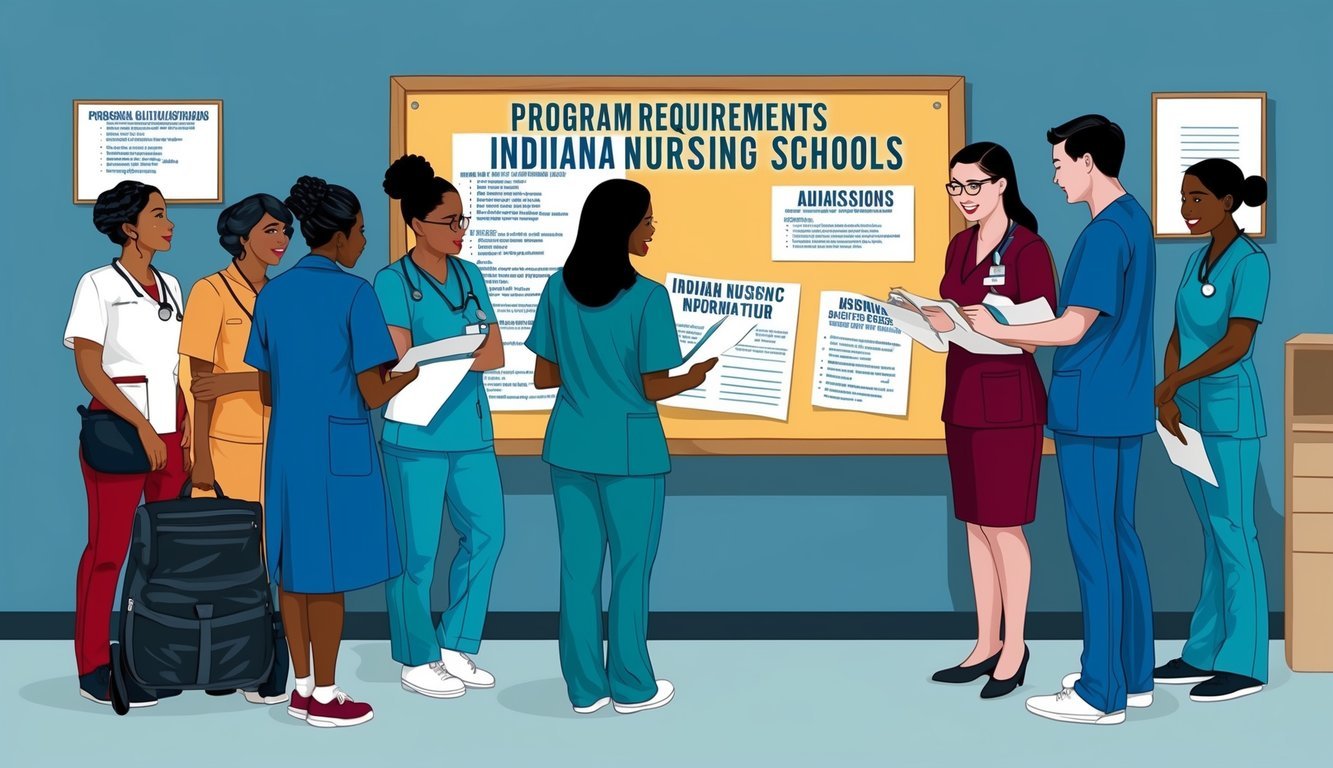Nursing education plays a crucial role in shaping future healthcare professionals.
If you are considering a nursing career, Indiana offers several top-ranked nursing schools that provide excellent programs and resources to help students succeed. With various pathways available, including BSN and MSN degrees, you have options to match your career goals.
These schools focus on providing quality education, hands-on clinical experience, and support for financial aid.
Many institutions also have strong ties to healthcare facilities, ensuring that you gain the practical skills needed in today’s healthcare environment.
Whether you are a high school graduate or looking to advance your career, Indiana’s nursing programs can guide your journey in this rewarding field.
As you explore your options, remember that choosing the right program can significantly impact your education and career.
Researching different schools and their offerings will help you make an informed decision for your future.
Key Takeaways
- Indiana offers a variety of nursing programs to fit different career goals.
- Many nursing schools provide financial aid options to help students manage costs.
- Strong clinical experiences are a key component of nursing education in Indiana.
Overview of Nursing Schools in Indiana
Nursing education in Indiana is varied and robust, with a range of accredited programs catering to different needs and interests.
The state offers various nursing degrees and flexible pathways, ensuring students can find a program that fits their goals.
Accreditation and Certification
In Indiana, nursing schools must meet specific accreditation standards to ensure quality education.
Accreditation bodies like the Commission on Collegiate Nursing Education (CCNE) and the Accreditation Commission for Education in Nursing (ACEN) play crucial roles.
Here are some well-known accredited nursing schools in Indiana:
| School Name | Accreditation Body |
|---|---|
| Indiana University | CCNE |
| Purdue University | CCNE |
| Ivy Tech Community College | ACEN |
| Indiana Wesleyan University | CCNE |
| University of Southern Indiana | CCNE |
| Indiana State University | CCNE |
Graduation from an accredited program is essential for taking the NCLEX-RN exam.
This is crucial for becoming a licensed registered nurse.
Diversity of Nursing Programs
Indiana’s nursing schools offer a wide spectrum of programs.
From Associate Degree in Nursing (ADN) to Bachelor of Science in Nursing (BSN) and even Master of Science in Nursing (MSN), there are many options.
Some schools that stand out with diverse offerings include:
- Ivy Tech Community College: Known for its ADN programs.
- Indiana Wesleyan University: Offers a BSN with a focus on holistic nursing.
- University of Evansville: Provides a unique RN-BSN program for registered nurses.
With multiple pathways, you can choose a program that suits your career stage.
Whether you are starting fresh or advancing your education, Indiana has the resources to help you succeed in your nursing career.
Admissions and Program Requirements

Understanding the admissions criteria for nursing programs in Indiana is essential for prospective students.
Requirements can vary by program type, including Bachelor of Science in Nursing (BSN) and Associate Degree in Nursing (ADN) pathways.
Entrance Criteria for BSN Programs
To gain admission to a Bachelor of Science in Nursing (BSN) program, you need to meet specific criteria.
Most programs, such as those at the IU School of Nursing, require a high school GPA of at least 3.8.
Additionally, you must apply by November 1 and declare pre-nursing as your major.
The application process often includes submitting standardized test scores, recommendation letters, and a personal statement.
Many schools also look for volunteer or work experience in healthcare settings.
You might find the following table helpful in comparing key requirements:
| Requirement | Details |
|---|---|
| High School GPA | 3.8 or higher |
| Application Deadline | November 1 |
| Supplemental Application | Required |
Some programs also offer Accelerated BSN Track options for those who already hold a degree in another field.
Associate Degree in Nursing (ADN) Pathways
The Associate Degree in Nursing (ADN) is another pathway for becoming a registered nurse (RN).
ADN programs typically have a quicker timeline than BSN programs, allowing for entry into the workforce sooner.
Most ADN programs require you to have a high school diploma, a specific GPA, and completion of prerequisite courses in subjects like biology and chemistry.
The admissions process may involve an interview and placement tests.
Here is a quick overview of common ADN program structures:
| Program Type | Typical Duration | Key Features |
|---|---|---|
| Traditional Track | 2 years | Full-time study, in-person classes |
| RN to BSN Track | 1-2 years | For those already licensed as RNs |
Several institutions in Indiana offer ADN programs, preparing students for the NCLEX-RN exam to obtain licensure.
You can explore specific program details through resources like the IU School of Nursing.
Tuition, Financial Aid, and Scholarships

Understanding the costs associated with nursing schools in Indiana is crucial for prospective students.
This includes examining tuition rates and available financial assistance options, such as scholarships.
Understanding Nursing School Costs
Nursing school tuition can vary significantly between in-state and out-of-state students.
In general, in-state tuition rates are lower, offering a cost-effective option for residents.
Here’s a basic comparison:
| Tuition Type | Estimated Annual Cost |
|---|---|
| In-State Tuition | $10,000 – $15,000 |
| Out-of-State Tuition | $20,000 – $30,000 |
In addition to tuition, you should also budget for fees, books, and supplies.
These costs can increase your total educational expenses.
It is important to research specific nursing programs to identify the exact costs you will incur.
Opportunities for Financial Assistance
Financial aid is accessible for nursing students through various programs.
The FAFSA is the first step in securing federal assistance.
You can apply for grants, loans, and work-study programs based on your financial need.
Indiana University, for example, offers over $700,000 in scholarships for nursing students annually, with typical awards ranging from $1,000 to $2,500.
Consider these types of financial assistance:
- Federal Grants: Need-based aid that does not require repayment.
- Scholarships: Awards based on merit or need that do not need to be paid back.
- Loans: Borrowed funds that must be repaid with interest.
For more information on specific scholarships available at Indiana nursing schools, visit the IU School of Nursing Financial Aid page.
This knowledge can help you minimize your educational expenses while pursuing your nursing degree.
Curriculum and Clinical Experience

The nursing curriculum in Indiana focuses on a blend of theoretical knowledge and hands-on clinical experience.
This combination prepares you not only for the NCLEX-RN exam but also equips you with essential skills for working in various healthcare settings.
Components of Nursing Education
Your nursing education includes several key components.
The curriculum covers subjects such as serious illness care, cancer prevention, and chronic condition management.
Here’s a quick overview of essential coursework:
| Course | Focus Area |
|---|---|
| Foundations of Nursing | Basic nursing skills |
| Adult Health Nursing | Management of adult chronic conditions |
| Maternal-Child Nursing | Care during pregnancy and postpartum |
| Psychiatric-Mental Health Nursing | Mental health assessment and care |
| Community Health Nursing | Public health and preventive care |
These courses focus on both critical thinking and practical skills, ensuring you can provide high-quality patient care.
Preparing for the Nursing Profession
Clinical experience is vital in your nursing education.
You will partake in required clinical hours at hospitals and clinics.
This hands-on experience helps you apply what you’ve learned in the classroom to real-life situations.
During your clinical rotations, you will work with patients experiencing various conditions.
This ranges from serious illnesses to routine health checks.
Exposure to diverse medical environments strengthens your ability to manage chronic conditions and other health issues.
Additionally, these experiences are critical for passing the NCLEX-RN exam.
They enable you to develop the confidence and expertise needed for your nursing career.
You should actively engage with patients and healthcare teams to maximize your learning during these rotations.
Career Prospects and Continued Education

The nursing field in Indiana offers promising career prospects and various paths for continued education.
With a growing nursing shortage, there are numerous job opportunities available.
You can enhance your skills and advance your career by pursuing additional degrees and certifications.
Evolving Roles in Nursing
The roles of nurses are continuously evolving due to advancements in healthcare and changing patient needs.
As a Registered Nurse (RN), you may focus on specialized areas such as pediatrics, geriatrics, or critical care.
The demand for Nurse Practitioners (NPs) is significant, as they can provide primary and specialized care.
This evolution opens doors for leadership positions, particularly in nursing management and education.
Additionally, many nurses are moving into roles as Nursing Faculty, shaping the next generation of healthcare providers.
Advanced Degrees in Nursing
Pursuing advanced degrees like a Master of Science in Nursing (MSN) or a Doctor of Nursing Practice (DNP) can greatly enhance your career.
An MSN allows you to specialize in areas such as nursing leadership or clinical practice, while a DNP emphasizes clinical practice, leadership, and policy.
Continuing education is vital for maintaining certification and expanding your knowledge.
Indiana has several graduate programs that cater to various interests and specialties.
For instance, you can explore academic resources through organizations like the Indiana State Board of Nursing and universities that offer nursing programs.
Investing in your education not only leads to personal growth but also positions you for high-demand roles in the healthcare system.
Frequently Asked Questions

This section provides specific answers to common questions about nursing schools in Indiana.
You will find details about accredited programs, undergraduate options, program durations, fast-track degrees, online availability, and information about Ivy Tech’s Nursing program.
What are the top accredited nursing programs in Indiana?
Several top accredited nursing programs are available in Indiana.
Notable institutions include Indiana University School of Nursing, Purdue University Northwest, and Ball State University.
The CCNE and ACEN have accredited these schools.
Which Indiana colleges offer the best undergraduate nursing programs?
Colleges like Indiana University, Purdue University, and University of Indianapolis are recognized for their strong undergraduate nursing programs.
They provide comprehensive training and have high NCLEX passing rates, which can help you succeed in your nursing career.
How long is a typical RN program in Indiana?
A typical Registered Nurse (RN) program in Indiana usually lasts between two to four years.
An Associate Degree in Nursing (ADN) generally takes two years, while a Bachelor of Science in Nursing (BSN) takes about four years to complete.
What are the options for fast-track nursing degrees in Indiana?
For those seeking fast-track nursing degrees, many schools in Indiana offer accelerated BSN programs.
These programs are designed for students who already hold a bachelor’s degree in another field.
They can be completed in about 12 to 18 months.
Are there any online nursing programs available through schools in Indiana?
Yes, several schools in Indiana offer online nursing programs.
Programs can range from RN to BSN degrees and even advanced practice nursing degrees.
Online learning allows for flexible scheduling, making it easier to balance your studies with work or other commitments.
Can you provide information about Ivy Tech’s Nursing program?
Ivy Tech Community College offers a well-respected nursing program.
They provide both ADN and practical nursing options.
Their curriculum focuses on hands-on training and clinical experiences to prepare you for a nursing career.
They also offer affordable tuition.
For more details, visit Ivy Tech’s Nursing Program.

